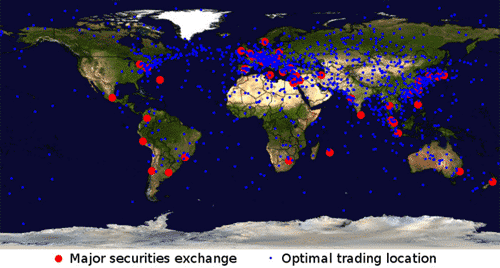Stock Trades at the Speed of Light

Red dots show the major exchange centers and blue dots mark the midpoints, where computers would ideally be stationed.
Companies around the world have spent millions of dollars making faster computers that can shave off tiny fractions of a second of processing time, to give them the edge in the market. Some of the fastest trading companies in the world claim that their computers can calculate a trade in 500 microseconds, a thousand times faster than the human eye can blink.
However no matter how fast these processors get, they will always run into the universal speed limit, the speed of light. According to Einstein's laws of Special Relativity, nothing in the universe can travel faster than light. No matter how clever the computer technicians, the laws of physics show that information can never travel faster than 186,000 miles per second. Planet Earth is so big that it takes light 67 milliseconds to travel from one end to another; hundreds of times slower than the fastest computers can calculate a trade.
The time it takes light to travel (or "propagate") creates problem for people farther away from where the action is happening because of lag or "latency." However, a team of physicists think they may have come up with a solution.
The problem arises in markets like currency exchanges, where the value of two different items is compared against each other. For example, if the value of the British pound starts to fall against the U.S. dollar, traders will want to sell off as many of their pounds as possible so they don’t lose money. Those who start selling off their pounds sooner will be able to sell for a higher price.
The problem arises when traders are at two different parts of the planets and it takes time for information to travel from one point to another. In this case, people in London will be able to react faster to the change than people in New York. It will take less time for Londoners to hear about the change in the price of the pound because they're closer than New Yorkers. It's even possible with a fast enough computer, Londoners will also be able to send their trading orders back to their bank in London, while the news of the falling pound is still on its way to New York and the yanks there have no idea what's going on. However if the opposite happened, and the dollar started to fall, it’s the Londoners with the big disadvantage.
The team's solution is to set up computers with automatic trading instructions at points precisely between the two locations. So in the case of New York and London, there would be a computer server tuned to the financial markets floating in the middle of the Atlantic Ocean. It would be able to get a jump on New York when something happens in London, and it would get the jump on something happening on London, when something started happening in New York.
The team identified all of the midpoints between 52 of the world's largest financial markets, marking places that would be ideal for their remote trading servers and creating the blueprint for a huge worldwide network.
"What we devised is a new type of reflex architecture for significantly shaving off time for geographically separated markets," said Alexander Wissner-Gross, one of the researchers on the project. "If we just look at say, New York and London where the time delay is on the order of 50 milliseconds, millions of dollars have been spent to shave off the milliseconds in hardware latencies."
Right now the biggest hang-ups the signal for a trade is likely to encounter are mostly still with the technology, not the laws of nature. Computers are fast, but it still takes time to process the billions of trades that happen, sometimes causing a traffic jam when too many traders try to buy or sell at any time.
However the time will come, likely sooner rather than later, that the speed of light will put the far side of the planet at a noticeable disadvantage. Does that mean that the new Wall Street might be on some boat in the middle of the ocean? Other factors like regulation and old fashioned logistics might stop the setup of such a global computer network.
"This latency of delay is becoming a very crucial aspect," said Victor Yakovenko, an econo-physicist also at the University of Maryland. "There is growing opinion that in fact the speed of trade should be delayed for exactly the reason of time propagation."
Logistics might also get in the way. Boragan Aruoba, an assistant professor of Economics at the University of Maryland said that building and maintaining servers in the ocean might be more trouble than it's worth. "That in itself will be a really costly enterprise I think."
At the same time, if their network works, countless traders throughout the world will be clamoring to get on the bandwagon. So many people will get involved, that no one person or firm will have the advantage over anyone else.
"People will take advantage of it to the point that there is nothing to take advantage of," Aruoba said.
Indeed in their report Wissner-Gross and Freer outline how this might happen. To compete with one company with a computer located halfway between two markets, a rival company would build two computers, each located halfway between the midpoint and the market. These two computers will then have the jump on the computer at the midpoint because they would be able to intercept the information first. Another company might then build yet another set of computers, closer in than the second set, and so on until there is a long line of computer servers coming out of the market, each one getting the important information before the next.
"It's like playing a game of telephone with a winning lotto number. The actual number will pass down with relative accuracy but the usefulness of that will be less because someone will have already acted on that," Wissner-Gross said. "The way info is stopped …if you have a string of trading nodes, if info tried to propagate down the string, the first trading node will act upon it and stop the info from traveling along."
"If there are no humans involved you can rent a building next to the stock exchange and put your machine right in there," said Aruoba. "It may make more sense to put the machines that run the trades next to the exchange centers,"
Nonetheless, Wissner-Gross and Freer said that they are currently talking to hedge funds and financial firms about licensing the technology they described. Their paper was published in the November 5 issue of Physical Review E.














